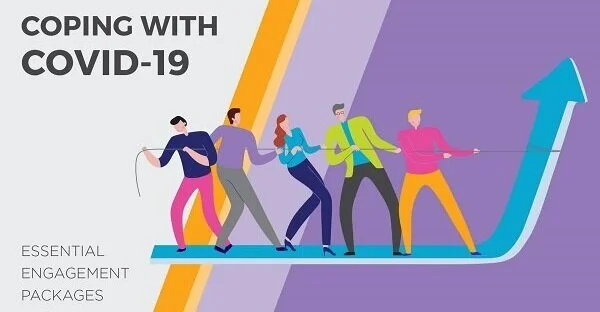We need to find a way forward. We’re seeing increasing trust divides between government and their citizens. You only have to see or hear a few news headlines to know that humans are facing really big problems that decision-makers are getting stuck on. From housing affordability and gender equality through to water security, climate change and the energy transition, there are tough issues before us that we simply have to solve. What if there was a way to tackle these ‘wicked problems’, answer the big questions and collectively agree on a way forward that was in the best interest of the many not the few? Here’s an insight into what that might look like - some inspiration, possibility and hope amongst the despair.
2021 IN REVIEW & A THANK YOU
As we reach the end of a huge year of expansion and exploration, we’re feeling grateful. We have some (pretty mind-blowing!) numbers to share, and some reflections on what impacted us and stood out this year. We do work that matters. In 2021 we helped thousands of people have influence over the issues that impact them. Thank you to our participants, clients and partners for making it possible.
DOMINANT VOICES IN DELIBERATION
Effective engagement is inclusive of a diverse range of perspectives. In deliberative processes, this is critical, as deliberation is underpinned by representativeness. When one or a few voices dominate the conversation, this becomes difficult to achieve. In this article we consider some ways to navigate this common issue.
MAKING A DECLARATION IS THE EASY PART
Globally, 1,807 local government bodies, such as municipal councils, have declared a climate emergency within the past 5 years. But making a declaration is the easy part. Partnering with the community to come up with responses to such a momentous and complicated challenge is not something that every council is willing to take on. But those who do will be rewarded with ideas and momentum from the community that council cannot possibly achieve on its own.
In this article we share with you a story of a local council in Victoria who has partnered with their community to respond to the climate emergency together.
FREE GUIDE ON DELIBERATIVE ENGAGEMENT FOR VICTORIAN COUNCILS
To help local councils in Victoria navigate the deliberative engagement requirements in the new Local Government Act, MosaicLab has launched a free, short guide.
This e-book is specifically for local government staff and decision makers, and aims to provide assistance and information to help councils better understand deliberative engagement, its principles and how it can be implemented into council processes to meet the new requirements of the Act.
BALANCING COST, RISK & BEST-PRACTICE THROUGH A TROUBLED TIME
It takes time, effort and resources to achieve best practice engagement at the best of times. And right now it’s not the best of times. We’re hearing from many that engaging at all (let alone engaging well) is difficult.
Your organisation may be grappling with how to respond to the crisis, facing reduced revenue and budget cuts, responding to increased demand for community support and services, and wondering how to sustain it all long term. Local government bodies are also working to comply with the enhanced engagement requirements set out in the Local Government Act.
So we’ve announced two new service options designed to help you engage robustly, cost-effectively and appropriately.
COPING WITH COVID-19: ESSENTIAL ENGAGEMENT PACKAGES
MosaicLab is here to support you and your team as you change and readjust in response to COVID-19. To help you acclimatise, we’ve put together two exclusive, new engagement service options.
We can work with you to help transition your team to working from home through an interactive, online, facilitated strategy session.
We’ve also launched a new training and coaching package - working with individuals or groups to support you to engage and connect with people appropriately through a time of anxiety and upheaval.
#MONTHLYMYTH: DISTRUST IS DUE TO A LACK OF UNDERSTANDING
Our May #MonthlyMyth focuses on an assumption that is often made about the community by managers, project leads and technical 'experts'.
Statements like "if only they understood X, Y or Z, they would see we were right!" are an indication of a potentially risky, yet common assumption that community opposition or distrust is based on ignorance or incapacity.
CRITICAL THINKING STUDY INSIGHTS PART 2: THE FACILITATOR
Recently, we posted an interview with Lyn Carson of Active Democracy and the newDemocracy Foundation, who is working in partnership with MosaicLab to research what happens when critical thinking skills, techniques and concepts are introduced to participants in a deliberative process.
Today, in Part 2, we're talking with MosaicLab co-founder Nicole Hunter, an experienced facilitator with extensive experience in deliberative engagement. Nicole, alongside MosaicLab's other two co-founders Keith Greaves and Kimbra White, has been working to integrate critical theories into real, on-ground processes.
#MONTHLYMYTH - EVERYDAY CITIZENS & COMPLEX TOPICS
Welcome to our February #MonthlyMyth post! Today, we're exploring a commonly held belief that prevents many organisations from engaging in a meaningful way with citizens around complex, technical or information-rich issues.
This one misconception can reduce an engagement process to a surface exercise without any real outcomes, create unintended and less than desirable consequences down the track and even prevent a potentially valuable engagement process from happening altogether.
So let's get into it - what can everyday citizens REALLY handle and should we ask them to handle it?













